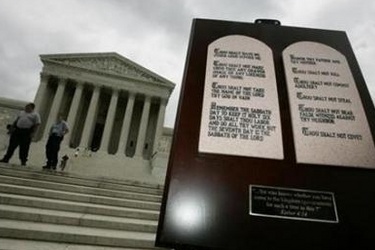US Court upholds 10 Commandments on public land
(Agencies)
Updated: 2008-03-27 15:26
Updated: 2008-03-27 15:26
SAN FRANCISCO -- A nearly 50-year-old monument inscribed with the Ten Commandments does not violate the Constitution just because it sits nearly alone on public grounds in a Washington city, a federal appeals court ruled on Wednesday.
The division between church and state is a core principle of American democracy, but courts have long struggled to find exactly where the dividing line falls.
|
|
The US 9th Circuit Court of Appeals cited precedent rulings in this latest case, which involves a 6-foot-tall (1.8-meter-tall) granite monument near the Old City Hall in Everett, Washington, about 25 miles north of Seattle.
The court found that the monument did not have a solely religious purpose. "Nothing about the setting is conducive to genuflection," Judge Kim McLane Wardlaw wrote for a three-judge panel.
She noted that the Everett monument does not have nearby benches or evening lighting and is surrounded by trees and that impair its viewing. Such a setting prevents a visitor from concluding that the monument has been placed in a sacred space on public grounds.
The monument was donated in 1959 by a national civic organization that distributed more than 150 such monuments to cities across the country.
Another stands on the grounds of the Texas Capitol and was the subject of a 2005 US Supreme Court case.
The Supreme Court found that the Texas statue did not violate the separation of church and state partly because it is one of more than three dozen statues that collectively tell a largely secular history of Texas.
The Washington monolith shares its property with only one war memorial, and attorneys had hoped the difference would be enough for a new verdict.
"Religious items displayed by themselves are generally impermissible," said Ayesha Khan of Americans United for Separation of Church and State. "This monument stands pretty much alone, and in that context, it presents a religious message."
But the 9th Circuit panel said it did not agree, especially because no complaints were received for more than 30 years after the monument was erected.
|
||
|
||
|
|
|
|
